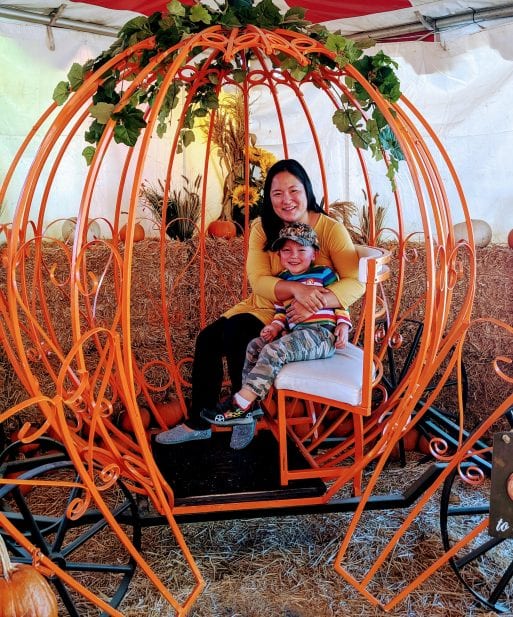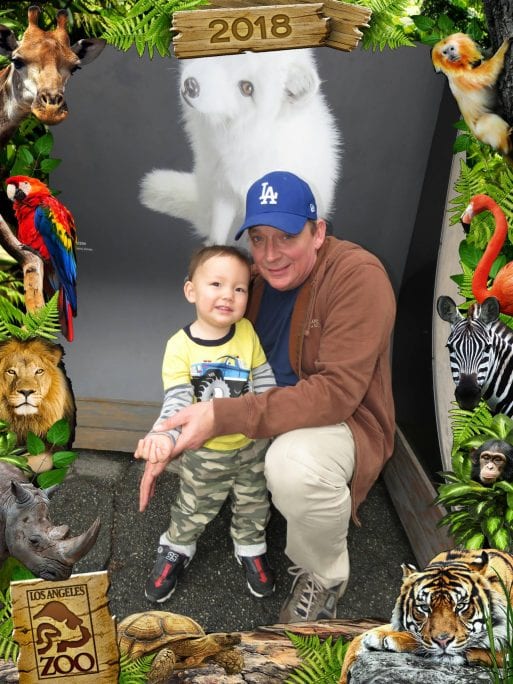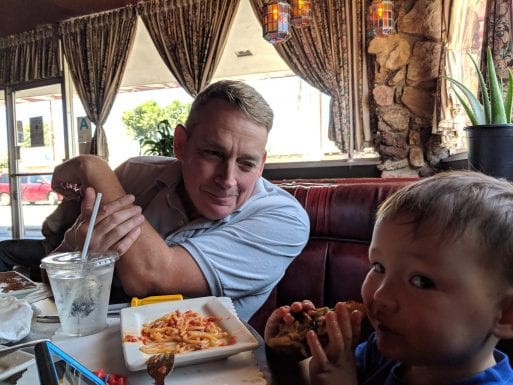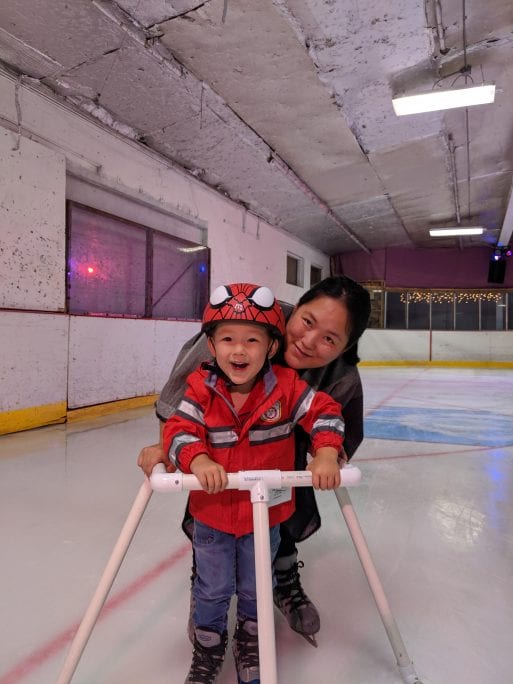
Emily Kil with her three-year-old son, Raymond, Jr. enjoying Halloween
Today SevenPonds speaks with Emily Kil, co-owner of the biohazard cleanup company Eco Bear. Emily co-owns the brand along with her husband, Raymond Magno. Eco Bear specializes in cleaning an area after a person has died, whether it be a natural death, suicide, crime scene cleanup, or something similar. They also clean homeless encampments on private property, as well as hazardous rodent droppings. Eco Bear is based in Studio City, California.
Lucas Morgan: Hello Emily! Thanks for talking with me today. What is Eco Bear?
Emily Kil: We are a biohazard cleaning company. So that means we clean what remains (after the body has been taken away) after a person passes away in a home or building, or after any kind of accident in the home. So we will clean blood and other bodily fluids. We also clean other things related to that like homeless encampment cleanups or even rodent dropping cleanups.
Lucas: What are both your and your husband’s educational and professional backgrounds?
Emily: I’m a Los Angeles native and went to the San Francisco Bay Area for college. I then worked in software sales for a while. My husband grew up in Maine and decided to join the Coast Guard. He then became a fisherman in Alaska, and I met him up there when I was on vacation. We have kind of been together ever since.
Lucas: How did you two get into the biohazard cleaning industry?
Emily: We initially started a regular kind of residential cleaning company, primarily to do eco-friendly cleanings. Eventually we decided to transition to biohazard cleanup. The margins are better and my husband is willing to do that kind of work. It’s certainly not for everyone.
Lucas: Why do you think the work Eco Bear does is important?
Emily Kil: I think one of the main things is that these families need the cleaning done before they can really move on with the rest of the grieving process, funeral service, etc. Cleaning the area where their loved one died is the first step after the body has been taken away. They need the area cleaned and the odor to go away. It’s traumatizing for these people to see their loved one that way.
The work we’re doing is helpful for families because it is a kind of work that a lot of people can’t or won’t do. It’s not glamorous at all. We’re a cleaning service, not super different than a normal kind of service. But the difference is that we perform a very specialized kind of cleaning that most people would never want to do.
Lucas: So you and your husband are co-owners?
Emily: Yes, we are a husband and wife team. I handle the office work and Raymond is the one who goes to the sites to clean. I went to a cleanup once and probably won’t go again. The odor that accompanies a dead body that may have been in the place for one or sometimes multiple days was too difficult for me to bear. It really is unlike anything else.
Lucas: Which areas do you serve?
Emily Kil: Primarily Los Angeles County. But we will go to Ventura, San Bernardino and Orange Counties.
Lucas: How do people find out about Eco Bear?
Emily: Our primary marketing method is through search engines and SEO (search engine optimization). We have tried reaching out to police stations and funeral homes, but that hasn’t led to much. We are starting to develop a decent referral system, like property management companies or individuals who have used us before.

Eco Bear co-owner Ray Magno and his son Ray Jr.
Lucas: Do you work much with police departments or emergency medical services?
Emily: No not really. We looked into that, but the reality is you have to spend a decent amount of money marketing to them and donating to their foundations to really get their attention.
Lucas: How many employees do you have?
Emily: We have one part-time employee. My husband pretty much does all the cleaning. We are a very tiny company.
Lucas: Interesting. I kind of envisioned a team of five people going in on a cleanup.
Emily: You don’t need or wouldn’t even want that many people. I think two people maximum. The cleanups are done in a way to prevent any cross-contamination. We aren’t cleaning your entire house. So if there was another person there to help, they would just be the “uncontaminated” one handing supplies to my husband really.
Lucas: What are the main kinds of jobs Eco Bear handles?
Emily: Primarily what we do are death scenes such as suicides or elderly people who had died of natural causes. The typical scene is someone who has died a natural death in their bed, or wherever they may have been. We have cleaned up drug and alcohol overdose sites as well.
Lucas: So you aren’t cleaning up horrific violent deaths on a regular basis?
Emily: No, and I’m glad we don’t have to. Those are emotionally very heavy and they can weigh on you. We’ve only cleaned one crime scene in two years, which is how long Eco Bear has been a biohazard waste removal company. I’m kind of grateful that’s the case.
Lucas: How long does a typical job take?
Emily: A normal job would take maybe three to four hours. This could be a situation where a person died in their bed and were found in a day or two. So decomposition has already begun.
Lucas: What are the rates that you charge?
Emily: It’s $250 per hour and $250 per waste bin. I can give someone a ballpark idea of how much it will cost when they describe the situation to me over the phone.

Ray Magno openly talks to his son about their business, so Raymond, Jr.
is used to conversations about death
Lucas: How do you dispose of biohazardous waste?
Emily: The waste just goes into a specialized incinerator. We have a contract with an incinerator company. Anything that is potentially contaminated goes in the biohazardous waste bins. Gloves, suits, rags, any tools, etc. that may have come in contact with the biohazards are all placed in those bins.
Lucas: What kind of protective gear does your husband wear on a job site?
Emily: It’s pretty basic. He’ll wear a Tyvek suit, a N100 mask, a face shield or anything to protect your eyes, exam gloves and some extra booties over your feet. The Tyvek suit covers your feet and has a hood as well.
Lucas: What types of chemicals do you use?
Emily Kil: It’s nothing that crazy really. You can get most of it on Amazon or at Home Depot. We use a combination of Clorox Fuzion, which is basically the strongest version of bleach they offer. We also use OdoBan and ProKure. It’s pretty straightforward.
Lucas: Does the time factor come into play at all when it comes to cleaning biohazards?
Emily: It’s not really super urgent to clean it all up quickly. Ideally, when a person dies, there would be family around them and they can process it all quickly so that they wouldn’t even need a biohazard cleaning company. There might be a death doula, nurse, doctor, etc. nearby to take care of it all.
But when a body has been somewhere for a number of days, it doesn’t really matter how long. Sometimes other biohazard cleaning companies will take that opportunity to try and make a high-pressure sale, saying, “You need to get this done now, time is of the essence,” but at that point it doesn’t really make a difference.
Lucas: Do you ever receive medical information about the person who died? I.e., whether their blood is contaminated with some kind of disease?
Emily: Usually people won’t tell us that. To be honest it doesn’t really matter; we would treat the situation the same way. We use the same equipment, same chemicals, etc. For instance one time a neighbor was the person responsible for giving us the key to open the house. When I called to confirm when we could get the key, she asked if I realized his blood was “toxic,” that he had hepatitis. That’s good to know, but does not affect the biohazard cleaning process.
Lucas: Is the biohazard cleaning service industry regulated at all?
Emily: No it isn’t. That’s important for people to know. Sometimes our competitors will say that they’ll give you a certificate certifying that the area is “officially clean,” but there isn’t anything like that. The California Department of Public Health will offer you a permit to do this kind of biohazard cleanup work. But they don’t offer any kind of certification that says the site is now clean.

Dealing with death for a living has helped Emily Kil
enjoy life’s precious moments even more
Lucas: Have your views and ideas about death changed at all since you started Eco Bear?
Emily: My husband and I talk about the work we do all the time. Before we started the company I never talked about death. I never even really thought about it. And as a society we tend to avoid it. Also, since we talk about it all the time, our three-year-old son is actually used to it now too. He knows everything and everyone will die at some point. Talking about it helps both of us to process the emotional tolls the jobs may take.
Lucas: Thank you so much again Emily for taking the time to speak with me!
Emily: No problem Lucas, it was my pleasure!

 Biohazard Cleanup: An Uncomfortable Subject Explained
Biohazard Cleanup: An Uncomfortable Subject Explained


 “Help Me, Helen”
“Help Me, Helen”
 Recovering Cremation Remains After the Los Angeles Fires
Recovering Cremation Remains After the Los Angeles Fires
 “As Tears Go By” by Marianne Faithfull
“As Tears Go By” by Marianne Faithfull














